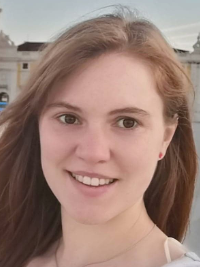Background:
I am a bioprocess engineer with experience in design, development, integration, and optimization of biotechnological products. I completed a bachelor’s degree in biotechnology at Universitat Autonoma de Barcelona and a Master of Science in Life Science & Technology with emphasis in Biochemical engineering and cell factory from TU Delft. There, I had the chance to be involved in innovative scientific projects focused on protein purification. At my industrial internship, I worked in the downstream process of therapeutic proteins from their first purification steps until their formulation and I acquired experience in advanced analytic techniques for bioprocesses. In addition, I develop viral vaccines using advanced technologies in mammalian cells and develop new methods for data management and data analytics. The past work experience drove my motivation and desire to be part of the CODOBIO ITN program working on continuous downstream process where I can further challenge myself to learn and gain expertise in the field.
About ESR 2:
Quality of product in batch and continuous: counter-current membrane filtration and chromatography
Recent improvements in upstream process and fermentation, the increasing competition between companies due to biosimilars, shifted the bottlenecks to the downstream of the process. A basic process for downstream purification accounts for approximately 50% of the manufacturing cost. Hence, there is a clear need of new approaches for protein purification. In the recent years, precipitation has gained interest as an alternative to protein A chromatography. It is a very versatile unit operation that can be employed for impurity as well as for product precipitation. To develop and to optimize these purification steps, microfluidic devices are an interesting tool. They advance to obtain process relevant data during early-stage process, shortening the time of the experiments and reducing the overall costs. These devices have been already used in upstream process development for therapeutic proteins and slowly they are being applied to the downstream process.
Short description of project:
Developing and optimizing alternative processes for protein purification and creating devices to determine the optimal operational conditions.
What new skill/skills did you learn?
I learned about prototyping tools like 3D printers and laser cutters, and I enhanced my understanding of downstream processing and process development. Nevertheless, the most valuable lesson was the ability to think independently and creatively. I also acquired other essential skills, including project management, time management, and effective scientific communication.
What did you enjoy most about your project?
I really enjoyed the intellectual challenges, the research autonomy, and the possibility to share knowledge, collaborate with colleagues, participate in conferences, and engage with field experts.
What do you believe is your biggest contribution to the scientific community?
Advancing toward alternative purification processes, such as precipitation, and the implementation of millifluidic devices for process development.
What would your advice be for future Early-Stage Researchers at the start of their project?
Do not be afraid and try to enjoy the moments, especially the challenging ones when everything seems to go wrong, and the rewarding moments when you discover solutions to your problems.
What do you plan next?
My plan is to continue my academic career as a postdoctoral associate, where I can contribute my expertise in process development for protein purification and prototype design, all while enhancing my research abilities and acquiring new techniques and methodologies.



